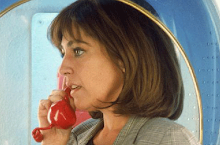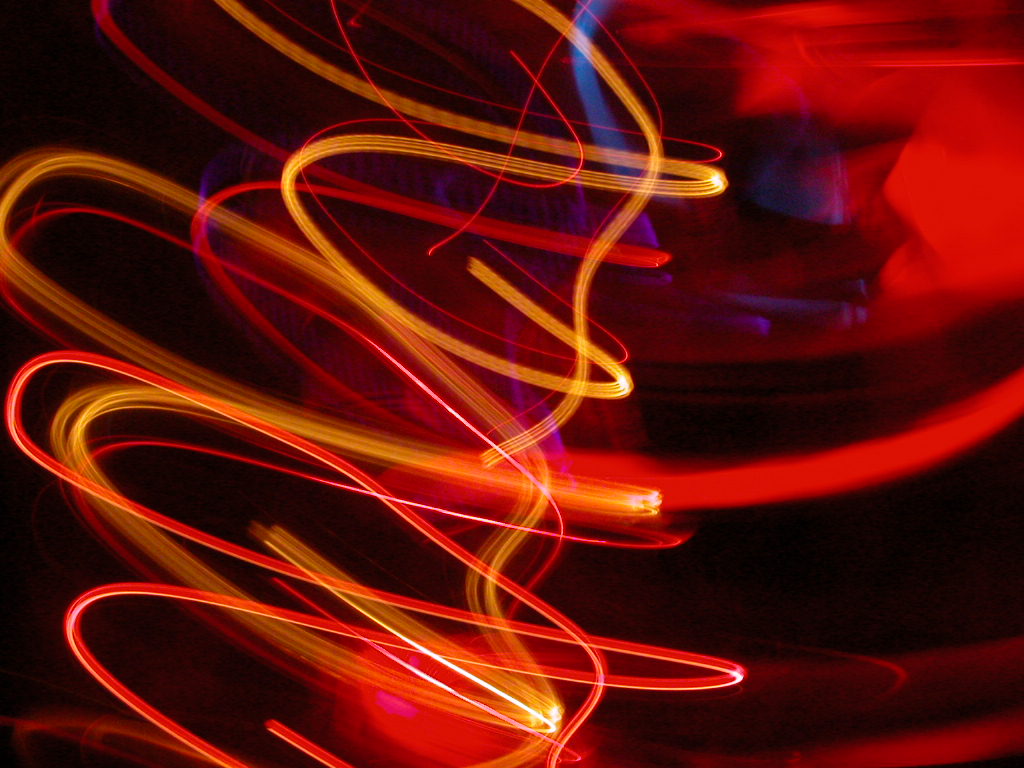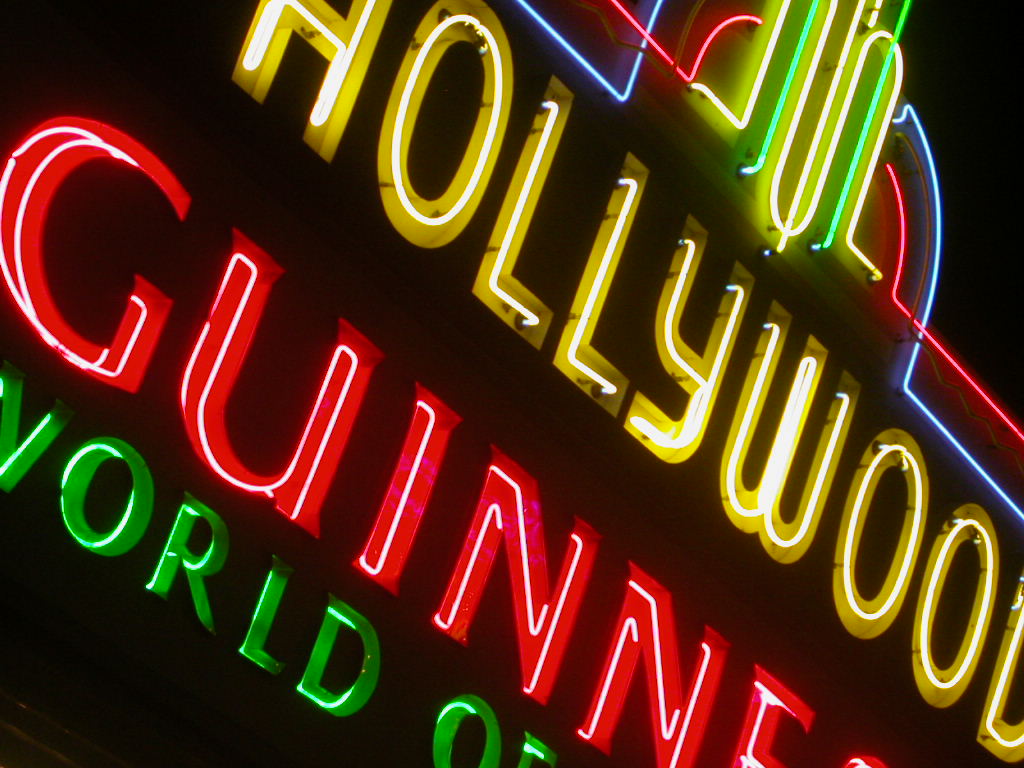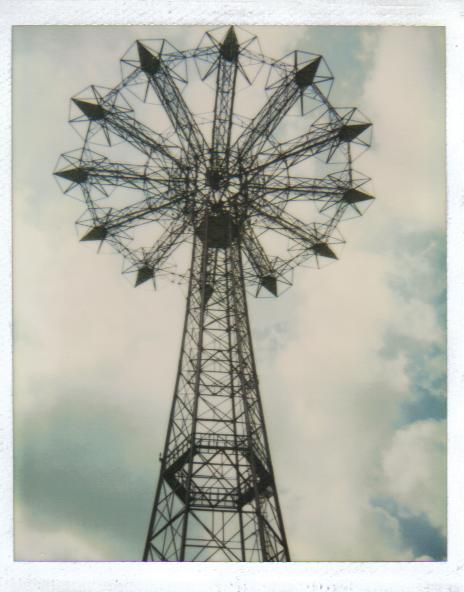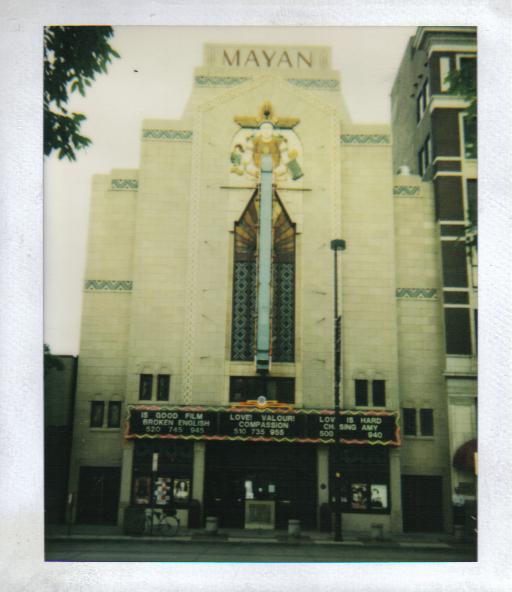Patsy Cline walkin'
After midnight, crazy too
Guess we feel the same
Monday, September 19, 2005
Tuesday, September 6, 2005
Film: Wong Kar-Wai's 2046
 Ahhh memories. Those misty, water colored boxes that we stack endlessly in the warehouse of our mind. Rows upon rows, each labeled and cross catalogued: '1995- Summer- Love- First Kiss- Joy', '1998- Winter- Love- Break-up letter- Sadness'. We take the time to store these elements everyday.The fresh smell of rain, the sweet taste of a peach, the wonderful touch of silk. Countless memories end up used and dumped; not relevant enough to make it to the archives. Others get the full treatment. Labled in big letters and put on a low shelf for easy access later; these are the ones that we return to like a novel we keep re-reading. Opening up these boxes produces more than just a faint image. These boxes have sight, sound and smell. Colors, a wafty song heard on the radio, cigarette smoke on the curtains. These memories transport us back in time for however long we want. Be careful or you might just want to stay there forever.
Ahhh memories. Those misty, water colored boxes that we stack endlessly in the warehouse of our mind. Rows upon rows, each labeled and cross catalogued: '1995- Summer- Love- First Kiss- Joy', '1998- Winter- Love- Break-up letter- Sadness'. We take the time to store these elements everyday.The fresh smell of rain, the sweet taste of a peach, the wonderful touch of silk. Countless memories end up used and dumped; not relevant enough to make it to the archives. Others get the full treatment. Labled in big letters and put on a low shelf for easy access later; these are the ones that we return to like a novel we keep re-reading. Opening up these boxes produces more than just a faint image. These boxes have sight, sound and smell. Colors, a wafty song heard on the radio, cigarette smoke on the curtains. These memories transport us back in time for however long we want. Be careful or you might just want to stay there forever.No filmmaker can visualize (and even fetishize) the power of memory like Wong Kar Wai. From Days Of Being Wild to Chungking Express, Fallen Angels to Happy Together, his vision (and to be fair that of his celebrated cinematographer Christopher Doyle) is one of people stuck living in a year that no longer exists. These folks float around like bored fish in an aquarium, content on being stuck forever in the world they used to inhabit, afraid of living in a world they know nothing about.
In his new film 2046, Wong Kar Wai reaquaints us with dapper journalist-cum-socialite Chow Mo Wan (played again with stark Clark Gable coolness by Tony Leung) who we first met in Wong's In The Mood For Love. Still smarting from the rejection of Su Li Zhen (played by Maggie Cheung) Chow now passes the time doing pulp fiction work and living in a flophouse called the Oriental Hotel. It is here that the vast majority of 2046's story unfolds.When moving into the flophouse Chow requests room 2046 only to have it not finished. He takes room 2047 and gets used to it. He then watches as a series of beautiful women (a virtual who's who of Asia's finest actresses) all move into and inhabit room 2046 over time. Chow meets Lulu (Carina Lau) an aging callgirl stuck loving the memory of a deceased man. Chow woos Bai Ling (Ziyi Zhang proving herself again as a fine new actress) a callgirl herself but one looking ahead and directly at Chow himself. Chow talks to Wang Jing Wen (Faye Wong), the daughter of the flophouse manager, who is carrying on an affair with a man in Japan despite her father's wishes. Finally, Chow reminisces about another Su Li Zhen (Gong Li) a mysterious gambler who reveals next to nothing about herself but fills him with familiarity . Chow's relationships to these women is tinged like a perfume by the haunting memory of the first Su Li Zhen. But where most memories pull us back into the past like anchors, Chow's does something interesting for him; it creates a past, present and future all revolving around the number 2046.
That number was the hotel room that Chow and Su carried on their clandestine meetings years before. While spending time with Wang he begins to work on a sci-fi pulp novel with her. The novel's time period? The year 2046, of course. More than just a clever plot device the presence of 2046 creates a bizarre quandry: Chow's actions in the present are affected by the memories of his past which has given birth to the future where everyone goes to forget the past and never returns (wrap your head around that one!). Every one of the women in Chow's life has a role in the future as designed- for- pleasure androids that cross the path of CC1966 (Chang Chen) a character devised after Chow himself who is trying to leave 2046 and everything it encapsulates. Through this character Chow can take a step back and view his relationship to all of the women around him, past and present.
It is within this vision of the future that we truly meet the character of Chow. As a writer his work asks that he plug into his past experiences to create new ones. We see that he is not just haunted by the memory of Su but of every woman that crosses his path. Will this opportunity to move ahead change his pattern of behaviour or will Chow choose to live in the world of 2046; past, present and future? The joy in the film is coming along for Wong Kar Wai's vivid ride.
Wong creates a simple canvas out of his vision of the future that doesn't distract from the stunning visuals that fill the central time period (late 1960's to be exact) but is instead a companion piece to all of the romantic action and a home for us all to imagine our problems and wishes ending up later. The film stays with you because Wong shows us aspects of our own memories, different as they are, that we rarely admit to others we noticed ourselves. The devil is in the details and Wong doesn't mind reminding us that obsession can stunt and diminish our own ability to enter the future awaiting us. We all have someone to get over. We all have someone we don't want to forget. 2046 reminds us that memories only have as much power as we give them but that that same power can be enough to take us into amazing uncharted territory but only if we can be brave enough to take the first step out of the past.
Directed by Wong Kar-Wai
(China/Hong Kong, 2005, 127min)
English Subtitles
Subscribe to:
Posts (Atom)
